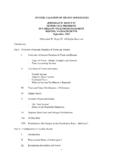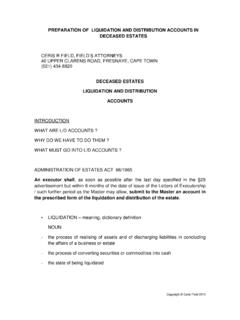Transcription of Clarification Concerning the Effect of Section 67(g) on ...
1 Part III - Administrative, Procedural, and Miscellaneous Clarification Concerning the Effect of Section 67(g) on Trusts and Estates Notice 2018-61. Section 1. PURPOSE. This notice announces that the Department of the Treasury (Treasury Department) and the Internal Revenue Service (IRS) intend to issue regulations providing Clarification of the Effect of newly enacted Section 67(g) of the Internal Revenue Code (Code) on the deductibility of certain expenses described in Section 67(b) and (e) and of the Income Tax Regulations that are incurred by estates and non-grantor trusts. Section 67(g) was added by An Act to provide for reconciliation pursuant to titles II and V of the concurrent resolution on the budget for fiscal year 2018, 115-97 (Act), which was enacted December 22, 2017.
2 This notice also requests comments on issues relating to Section 642(h)(2) and (h)-2(a) in light of new Section 67(g). 1. Section 2. BACKGROUND. Section 11045 of the Act added Section 67(g) to the Code, which generally provides that, notwithstanding Section 67(a), no miscellaneous itemized deductions shall be allowed for any taxable year beginning after December 31, 2017, and before January 1, 2026. Section 61(a) defines gross income as all income from whatever source derived, including (but not limited to) the items listed in sections 61(a)(1) through (15), except as otherwise provided in subtitle A. Section 62(a) defines the term adjusted gross income for purposes of subtitle A.
3 As, in the case of an individual, gross income minus the deductions listed in sections 62(a)(1) through (21). Section 63(a) defines taxable income for individuals who itemize their deductions, for purposes of subtitle A, as gross income minus the deductions allowed by chapter 1 (other than the standard deduction). Section 63(d) defines the term itemized deductions for purposes of subtitle A as the deductions allowable under chapter 1 other than (1) the deductions allowable in arriving at adjusted gross income, (2) the deduction for personal exemptions provided by Section 151, and (3) the deduction provided in Section 199A.
4 Section 67(a) provides generally that, in the case of an individual, the miscellaneous itemized deductions for any taxable year shall be allowed only to the extent that the aggregate of such deductions exceeds 2 percent of adjusted gross 2. income. Section 67(b) defines the term miscellaneous itemized deductions for purposes of Section 67 as meaning the itemized deductions other than those listed in sections 67(b)(1) through (12). Section 67(e) provides that, for purposes of Section 67, the adjusted gross income of an estate or trust shall be computed in the same manner as that of an individual, except that (1) the deductions for costs which are paid or incurred in connection with the administration of the estate or trust and which would not have been incurred if the property were not held in such estate or trust, and (2) the deductions allowable under sections 642(b), 651, and 661 shall be treated as allowable in arriving at adjusted gross income.
5 Section (a) states that Section 67(e) provides an exception to the 2-percent floor on miscellaneous itemized deductions for costs that are paid or incurred in the administration of an estate or a trust not described in (g)(1)(i) (a non-grantor trust) and that would not have been incurred if the property were not held in such estate or trust. A cost is subject to the 2-percent floor to the extent that it is included in the definition of miscellaneous itemized deductions under Section 67(b), is incurred by an estate or non-grantor trust, and commonly or customarily would be incurred by a hypothetical individual holding the same property.
6 Section (b) provides generally that, in analyzing a cost to determine whether it commonly or customarily would be incurred by a hypothetical individual 3. owning the same property, it is the type of product or service rendered to the estate or non-grantor trust in exchange for the cost, rather than the description of the cost of that product or service, that is determinative. It further provides specific examples of costs that will be considered commonly or customarily incurred by individuals and those that will not. Section (c) provides that, subject to certain exceptions, if an estate or non- grantor trust pays a single fee, commission, or other expense for both costs that are subject to the 2-percent floor and costs (in a more than de minimis amount) that are not, then, except to the extent provided otherwise by guidance published in the Internal Revenue Bulletin, the single fee, commission, or other expense (bundled fee) must be allocated, for purposes of computing the adjusted gross income of the estate or non- grantor trust in compliance with Section 67(e)
7 , between the costs that are subject to the 2-percent floor and those that are not. Section 3. REGULATIONS TO BE ISSUED ADDRESSING THE Effect OF. Section 67(g) ON CERTAIN estate AND NON-GRANTOR TRUST EXPENSES. Commentators have suggested that new Section 67(g) might be read to eliminate the ability of estates and non-grantor trusts to deduct any expenses described in Section 67(e)(1) and for the taxable years during which the application of Section 67(a). is suspended. The Treasury Department and the IRS do not believe that this is a correct reading of Section 67(g). For the taxable years during which it is effective, Section 67(g) denies a deduction for miscellaneous itemized deductions.
8 Section 67(b). defines miscellaneous itemized deductions as itemized deductions other than those 4. listed therein. Section 63(d) defines itemized deductions by excluding personal exemptions, Section 199A deductions, and deductions used to arrive at adjusted gross income. Therefore, neither the above-the-line deductions used to arrive at adjusted gross income nor the expenses listed in Section 67(b)(1) (12) are miscellaneous itemized deductions. Section 62(a) defines adjusted gross income of an individual, and Section 67(e) provides that the adjusted gross income of a trust or estate is determined in the same way as for an individual, except that expenses described in Section 67(e)(1).
9 And deductions pursuant to sections 642(b), 651, and 661 are allowable as deductions in arriving at adjusted gross income. Thus, Section 67(e) removes the expenses described in Section 67(e)(1) from the category of itemized deductions (and thus necessarily also from the subset of miscellaneous itemized deductions) and instead treats them as above-the-line deductions allowable in determining adjusted gross income under Section 62(a). Therefore, the suspension of the deductibility of miscellaneous itemized deductions under Section 67(a) does not affect the deductibility of payments described in Section 67(e)(1).
10 However, an expense that commonly or customarily would be incurred by an individual (including the appropriate portion of a bundled fee) is affected by Section 67(g) and thus is not deductible to the estate or non- grantor trust during the suspension of Section 67(a). Nothing in Section 67(g) impacts the determination of what expenses are described in Section 67(e)(1). Additionally, nothing in Section 67(g) affects the ability of the estate or trust to take a deduction listed under Section 67(b). These deductions remain outside of the 5. definition of miscellaneous itemized deduction. For example, Section 691(c).
















